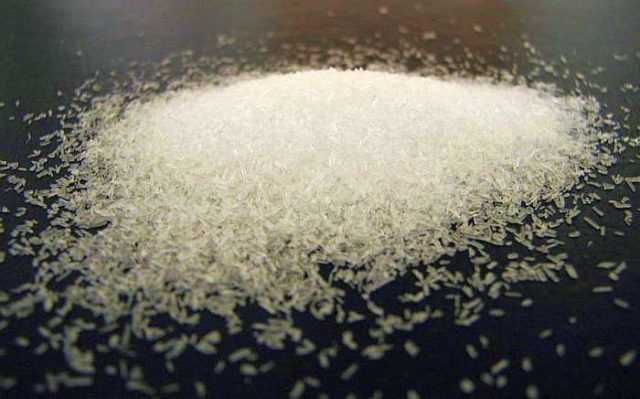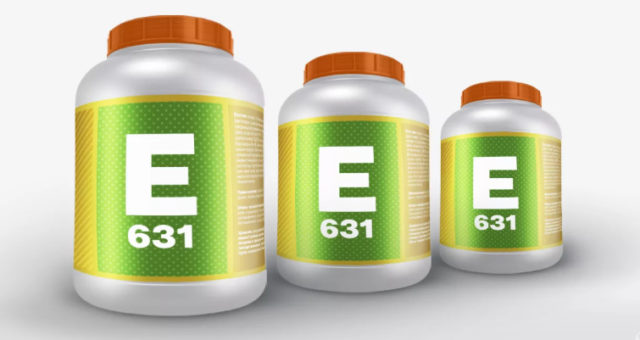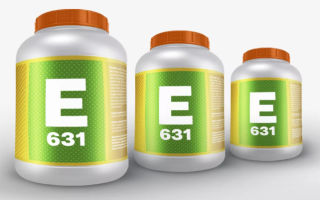Content
Food additive E631 is a disodium salt of inosinic acid. In the food industry, it is used to enhance the taste of a dish, it belongs to substances of natural origin. In the composition of products, it can often be found in combination with sodium guanylate.
What kind of additive is E631
Food additive E631 is contained in food products that have undergone thorough heat treatment. The formula for the chemical is C10H11N4Na2O8P. Despite the fact that the additive is presented in the natural environment, it is artificially mined for use in the food industry. E631 belongs to purines, which are natural precursors of RNA and DNA.
Externally, food supplement E631 is a white powder with a crystalline structure. Its characteristic features include good water solubility. In living nature, inosinic acid is present in the body of pigs and marine fish. In the food industry, it is not used as an independent ingredient. The properties of E631 are enhanced with sodium guanylate or sodium glumate. The tandem obtained from these components is called sodium ribonucleotide.

E631 food additive composition
To understand the effect of sodium inosinate on the body, it is enough to disassemble the structure of the substance and its properties. E631 is the disodium salt of inosinic acid. It is obtained by direct fermentation using microbiological strains. Sometimes it is produced by the method of enzymatic hydrolysis of fungi. Food supplement E631 affects the L-glutamine receptors, which are located on the surface of the tongue. Due to this, it has become widespread in the food industry as a preservative. The additive is able to restore and enhance the taste properties of the product lost during the production process.
Is sodium inosinate harmful or not
The principle of the effect of E631 on the human body causes a lot of controversy. The supplement is officially recognized as completely safe for health. But it should be borne in mind that flavor enhancers and preservatives are not fully understood. From time to time, some of them cease to be used in the food industry due to the ambiguous effect on the human body. The volume of the substance does not require labeling. This is due to the fact that the additive is present in food in too small dosages. That is why it is not capable of harming health.
The food supplement is well absorbed by the digestive system. Its remainder is excreted by the kidneys. The flavor enhancer E631 has no carcinogenic effect and is not considered a toxin. In addition, it rarely provokes an allergic reaction. The supplement does not have a negative effect on brain function.
Medical research has shown that E631 increases the body's resistance to certain diseases. In addition, representatives of the European Society of Pediatric Gastroenterology claim that E631 supplementation is effective in nursing premature babies.
As part of baby food, it performs the following functions:
- normalization of the psychomotor function;
- participation in the formation of intestinal microbiocenosis;
- stimulation of the child's weight gain.
Among other things, the positive effect of E631 on the functioning of the liver and the hematopoietic system is noted. The substance does not have a depressing effect on the reproductive function. But it has a positive effect on lipid metabolism in the body.
Despite the many useful properties, the food supplement is still capable of provoking side effects. They are called "Chinese Restaurant Syndrome". Mostly, they relate to the work of the digestive system. The provoking factor is excessive absorption of foods containing E631.
Adverse reactions include:
- increased heart rate;
- muscle weakness;
- hyperemia of the skin of the face;
- headache;
- increased sweating;
- drops in blood pressure.

E631 food additive is dangerous or not
The influence of the food additive e631 on the body is of particular concern to supporters of a healthy lifestyle. After all, the flavor enhancer is included in a huge number of products. With a moderate intake into the body, E631 does not pose a threat to health.
Hypertensive patients should limit the use of foods containing this substance, as it can increase the level of blood pressure. The same should be done for people with kidney stones and gout. It is necessary to exercise caution in patients with chronic pathologies. E631 can stimulate their aggravation.
There is also a possibility of collision with a stool disorder. This is possible only with excessive consumption of the product in food. The supplement provokes both constipation and diarrhea. But it does not have a systemic effect on the body, since it does not accumulate in the body.
Where and why add preservative E631
The preservative E631 is added to products that have changed their taste during industrial processing. It stimulates receptors, increasing a person's appetite. Today the food additive E631 can be found in the following products:
- sausages;
- sausages;
- chips and snacks;
- semi-finished products;
- instant noodles;
- canned food;
- meat products;
- soy sauce;
- baby milk formula.
No food supplement E631 is used without glutamic acid. If only it is indicated in the list of ingredients, glutamate may be present in other components described in the composition. The use of a food additive in production helps to restore the taste of the product, thereby reducing its cost. At the legislative level, the use of a preservative in industry is not prohibited.
Sometimes a flavor enhancer can be found in popular dishes presented in catering chains. For example, E361 is often added to hamburgers, various sauces and soups. Due to this, the institution manages to attract more customers.
It is believed that the flavor enhancer causes a kind of dependence on certain foods. When consumed excessively, food intake becomes not a way of replenishing energy, but a ritual that brings pleasure. This has a positive effect on the volume of sales of products, but does not always bring health benefits. Therefore, the need to use a flavor enhancer in the food industry still causes a lot of controversy.
Conclusion
Food supplement E631 does not cause significant harm to human health. Despite this, foods with its content should be eaten in strictly limited quantities. Otherwise, you may face an allergic reaction and gastrointestinal upset.

